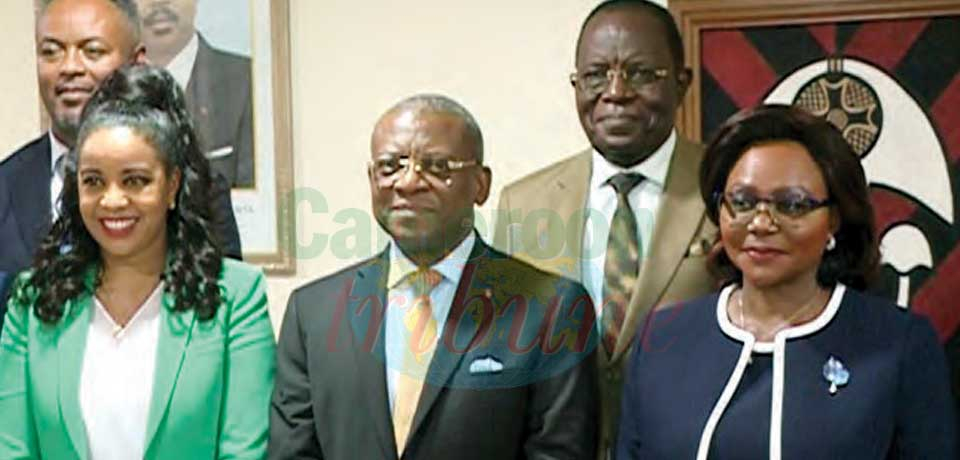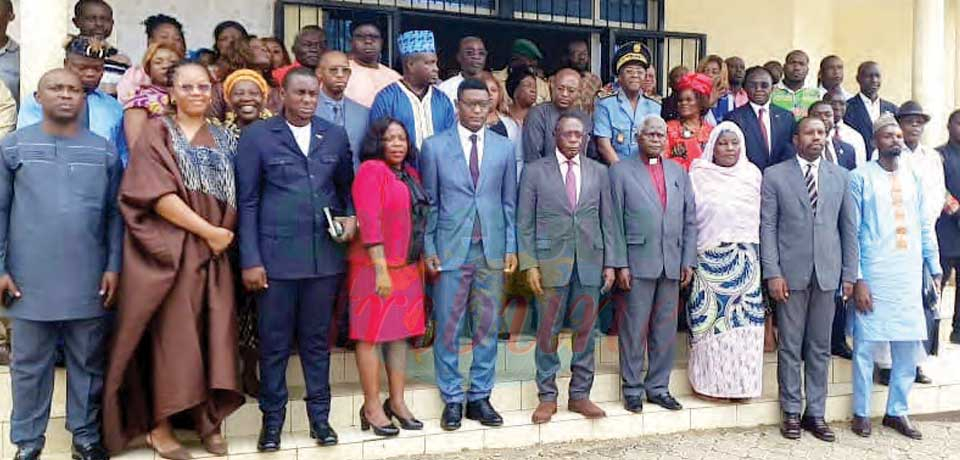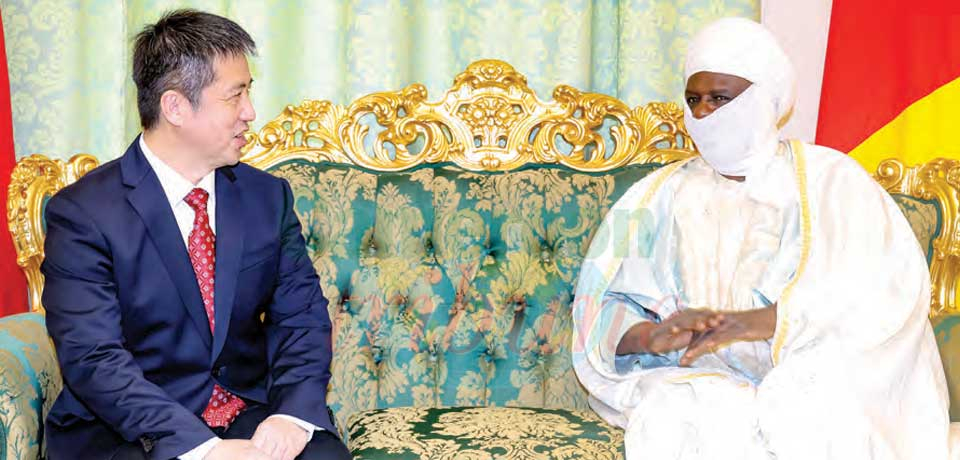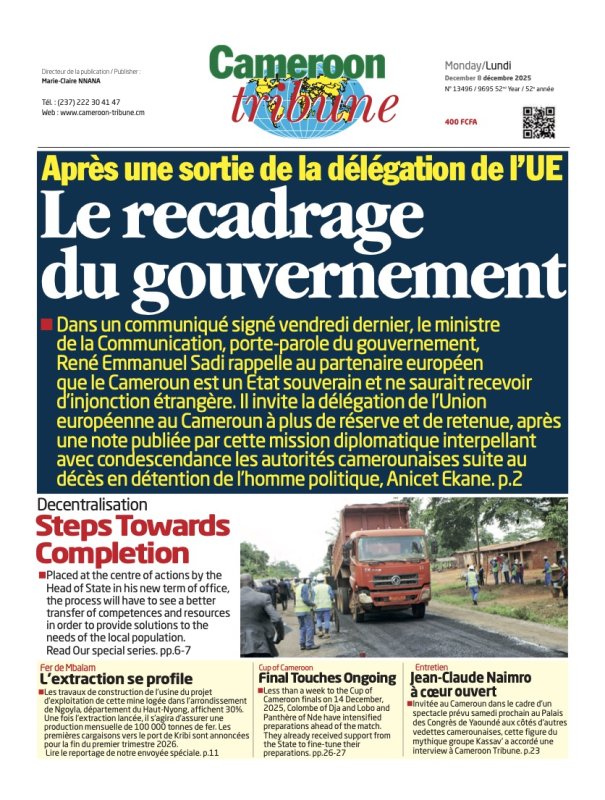Complaint Over 1961 Plebiscite: United Kingdom’s Court Gives Verdict
- Par Crown copyright © 2018 Thomson Reuters
- 26 Nov 2018 09:38
- 0 Likes
Following is the decision of the High Court of Justice Queen’s Bench Division on the case pitting Makweley Lysongo against The Foreign and Commonwealth Office, The Government of La Republique Du Cameroun.
“Makweley Lysongo v The Foreign and Commonwealth Office, The Government of La Republique Du Cameroun Case No: HQ17X03342 High Court of Justice Queen’s Bench Division 5 November 2018 [2018] EWHC 2955 (QB) 2018 WL 05791911 Before: The Honourable Mrs Justice Farbey DBE Date: 5 November 2018 Hearing date: 25 October 2018 Representation The Claimant appeared in person. James Purnell and Sean Aughey (instructed by Government Legal Dept. ) for the First Defendant. The Second Defendant did not appear and was not represented. Judgment Mrs Justice Farbey: Introduction 1- This is an application by the Foreign and Commonwealth Office (‘FCO’) to strike out the claimant’s case on the basis that the High Court has no jurisdiction to hear it. On 14 September 2017, the claimant Mr Makweley Lysongo lodged a claim form seeking relief against Her Majesty’s Government and the Republic of Cameroon on the basis of wrongs alleged to have been done by the United Kingdom to the people of the former British Southern Cameroons (‘BSC’). It is said that those wrongs took place before and at the time of independence from the United Kingdom when BSC became part of the Republic of Cameroon. 2- By way of relief, the claimant seeks declarations that the union of BSC and Cameroon was illegal and invalid; that the illegal ceding of BSC to Cameroon means that the Republic of Cameroon (the second defendant) has no right to govern that part of its territory which was previously under British administration; that BSC remains part of the United Kingdom; and that the FCO has breached international law and United Nations (‘UN’) resolutions by the manner in which it divested itself of the administration of BSC. The claimant seeks a number of other orders including damages. I need not set out the details. The claim having been lodged against the United Kingdom Government, the FCO applied and was granted permission to be substituted as the first defendant. The second defendant has taken no part in the proceedings. 3- The claimant seeks to bring the claim on behalf of the population of BSC. I have not seen any proper evidence that other individuals wish to be joined with Mr Lysongo in the claim and so I shall refer to Mr Lysongo as the claimant. Case management has to date been undertaken by a Master of the Queen’s Bench Division and I heard the application in the Civil List. It remains a moot point whether the case would properly fall to be heard in the Administrative Court. In the event, it has not been necessary for me to decide whether the case should be transferred: I will in this judgment deal only with the merits of the FCO’s application. 4- Both the claimant (who appeared in person) and Mr James Purnell and Mr Sean Aughey who appeared on behalf of the FCO produced skeleton arguments. Mr Purnell and Mr Aughey made detailed submissions about jurisdiction on a number of different bases. I mean no disrespect to their submissions by dealing with only some of their arguments which are nevertheless sufficient to determine the FCO application and dispose of the claimant’s case. I have kept this judgment as succinct as the nature of the issues allows: no useful purpose would be served by anything else. The Facts 5- In terms of evidence, I was provided with a statement from Dr Robert Dixon who is Head of the West Africa Department within the FCO. Mr Lysongo produced the results of his researches in the National Archives and elsewhere. Both parties took me in detail to events which led to the formation of the Republic of Cameroon as an independent state. From 1884, the territory of the present-day Republic was a German colony. After the defeat of Germany in the First World War, it was divided between French and British rule under the Franco-British Declaration of 10 July 1919. Following a period under British Mandate, the territory governed by the United Kingdom was brought within the United Nations International Trusteeship System, established by Chapter XII of the Charter of the United Nations (San Francisco, 1945). Under Chapter XII, the purpose of Trusteeship was to administer and supervise certain territories in order to advance their progressive development towards self-government or independence as was ‘appropriate to the particular circumstances of each territory and its peoples and the freely expressed wishes of the peoples concerned’. The basic objectives of the system included the encouragement of respect for human rights for all (UN Charter, Arts 75 and 76). The Trusteeship System did not in itself alter the rights of any states or peoples (UN Charter, Art 80). Trusteeship operated through individual trusteeship agreements (UN Charter, Art 75). 6- The United Kingdom became the administering authority under Chapter XII for the territory previously governed by British Mandate. A Trusteeship Agreement was approved by the United Nations on 13 December 1946 (Treaty Series No. 20 (1947), Cmd. 7802). Under Article 3 of the Trusteeship Agreement, the UK undertook (among other things) to ‘administer the Territory in such a manner as to achieve the basic objectives of the international trusteeship system’ laid down by the Charter and to ‘collaborate fully’ with the United Nations General Assembly (‘UNGA’) in the discharge of all its functions. By virtue of Article 5 of the Trusteeship Agreement, the UK was granted ‘full powers of legislation, administration and jurisdiction’ in the territory that constituted the Trust. The UK used its jurisdiction to divide the Trust territory into the Northern and Southern Cameroons. 7- By Resolution 1350 (XIII) of 13 March 1959, UNGA recommended that the UK take steps towards plebiscites - to be organised by the UK under UN supervision – in both the Northern and Southern Cameroons. The reason for two separate plebiscites was UNGA’s recognition that the people of the North and South might choose to go separate ways (UNGA, Fifteenth Session, Official Records, 994th Plenary Meeting, 21 April 1961, UN Doc.A/PV.994, para 163). The expressed purpose of the plebiscites (in paragraph 1 of Resolution 1350 (XIII)) was to ascertain the wishes of the inhabitants of the Trust territory concerning their future. Resolution 1350 (XIII) recommended that the plebiscite in BSC should be conducted in the dry season between December 1959 and April 1960. In the same Resolution, UNGA referred to two alternative questions to be put to the people of BSC. Those two questions were expressed in Resolution 1352 (XIV) as: (a) Do you wish to achieve independence by joining the independent Federation of Nigeria? (b) Do you wish to achieve independence by joining the independent Republic of the Cameroons?’ 8- It is readily seen that there was no question about remaining within the Crown’s territories and no question about becoming a separate state. The claimant submits that it was contrary to the objectives of Trusteeship to remove the option of self-determination from the plebiscite. Mr Purnell emphasised that the UN was integrally involved with the Trusteeship and with the BSC plebiscite, to the extent (for example) of recommending the period in which it should take place and deciding the questions. UNGA was central to the general movement towards decolonisation, reflecting the consensus of the international community in the post-war years. Mr Purnell’s analysis is wholly consistent with the contemporaneous Resolutions which have been placed before me. 9- Plebiscites duly took place and, in the event, the North and South decided to go different ways. The North voted to become part of Nigeria and BSC voted to become part of the Republic of Cameroon. Consequent upon the plebiscite result, BSC became part of the Republic of Cameroon on 1 October 1961. BSC therefore joined territory which had previously been administered by France. Prior to BSC joining the Republic, the United Kingdom had through an Exchange of Notes obtained an assurance that unification would be on the basis of a federation (UN Doc.A/PV.994, above, para 170). 10- As it no longer administered BSC, the UK terminated the Trusteeship Agreement on 1 October 1961. The termination was in the form of a Royal Proclamation published on 26 September 1961. That Proclamation was an executive act done in the exercise of foreign policy powers. The claimant has provided a copy of an Exchange of Notes between the British Ambassador and the President of the Republic of Cameroon in September 1961. The Notes show that the United Kingdom ceased to exercise trusteeship, and the Trusteeship Agreement came to an end, at midnight on 30 September 1961. The inevitable consequence was that the UK ceased to exercise any legal authority in the area. 11- On 1 October 1961, the Republic adopted a new constitution and changed its name to the Federal Republic of Cameroon. In 1972, a second Constitution abolished the federal system and changed the name to the United Republic of Cameroon. A third Constitution was adopted in 1984 and changed the name to the Republic of Cameroon. 12- The current domestic situation within Cameroon is volatile. Dr Dixon confirms in his witness statement: ‘There is an ongoing political crisis in Cameroon, which is rooted in a long running dispute over the status of the Anglophone regions, and in particular the deeply held view by many Anglophones that they have been marginalised by the Francophone majority. A key part of this contention concerns constitutional amendments enacted following 1961, particularly in 1972 (changing the constitution from a federation to a union), which concentrated power in the largely Francophone central Government. Long running tensions erupted into violence in 2016 following protests against the imposition by the Government of Cameroon of Francophone law and curriculum on Anglophone courts and schools. 13-Dr Dixon goes on to explain that these developments have had the effect of galvanising an independence movement. On 1 October 2017, Anglophone secessionists unilaterally declared the establishment of the so-called ‘Republic of Ambazonia’. The security situation is fragile. Estimates vary but up to 1000 people are believed to have been killed. The United Nations estimates that there are over 282,000 Internally Displaced Persons in Cameroon and nearly 27,000 refugees in Nigeria from the affected regions. The Parties’ submissions 14- The FCO submits that the English courts have no jurisdiction to hear the claim on a number of grounds. First, the claimant asks the Court to interpret and apply provisions of international instruments (such as the UN Charter, the Trusteeship Agreement, UNGA resolutions and the Exchange of Notes about federation) which have not been incorporated into English law. Secondly, the conditions for the application of the doctrine of Crown act of state are satisfied. Thirdly, the common law doctrine of foreign act of state applies. Fourthly, the UN has immunity from suit and legal process. The FCO submits in addition that the Republic of Cameroon cannot be sued as a defendant because it has State immunity as a matter of customary international law and as a matter of statute ( s.1 of the State Immunity Act 1978 ). 15- By the time of the hearing, the claimant had submitted a number of written documents to set out his position. After the hearing had concluded, he sent the Court an additional written submission which he thereafter sought to amend by way of another lengthy document. Those additional documents added nothing of substance to his statement of case and skeleton argument. His overall case rests (upon analysis) on three principal submissions. First, he submits that, in breach of the principles of human rights or discrimination law, the transfer of BSC from UK administration to the new Republic was undertaken without a governing treaty. He submits that the absence of a treaty has had very serious adverse consequences for the present residents of the former territory of BSC. He submits in particular that it enabled the Government of Cameroon to move away from a federal state to a centralised state to the detriment of civil rights of those who reside in the former BSC. 16- Secondly, the claimant submits that the failure to secure the rights of BSC residents on a long-term basis was a gross breach of trust by the UK. When I asked him to clarify his submission, he told me that the UN had passed the assets of BSC to the UK as trustee. The UK was bound to preserve and deal with those assets for the benefit of the people of BSC who were the beneficiaries of the trust. He submitted that the Trusteeship could not lawfully be operated other than for the benefit of the people of BSC, in a way which was analogous to the English law of trusts. 17- Thirdly, the claimant submits that the effect of the United Kingdom’s failure to implement a treaty (causing breaches of human rights law) and the breach of trust is to render the termination of the Trusteeship Agreement unlawful, which in turn rendered the transfer of BSC to Cameroon unlawful. 18- As to the jurisdiction of the English courts, the claimant submits that this derives from the Trusteeship Agreement itself. Alternatively, he asks the Court to accept jurisdiction under the English law of trusts. He submits that neither the doctrine of foreign act of state nor the doctrine of state immunity applies. 19- It is convenient to consider the question of jurisdiction in the context of the various aspects of the claimant’s overall position. No governing treaty 20- The claimant places at the centre of his claim that the transfer of BSC from British administration to the Republic of Cameroon was not governed by any treaty. The point appears to be (at its highest) that the Trusteeship Agreement ought not to have been terminated in the absence of a treaty setting out human rights and non-discrimination guarantees for the inhabitants of BSC and their descendants. He relies in the main on internal Government correspondence and communications (which have now entered the public domain) in order to argue that the United Kingdom at the time placed its own geo-political interests in West Africa above what he contends were the rights and interests of the people of BSC. He says that the assurance of a federation did not prevent later change to the constitution to the detriment of the former inhabitants of BSC. He accuses the United Kingdom of influencing UNGA to agree to the rushed termination of Trusteeship with no long-term constitutional guarantees. Citing various parts of the UN Charter, he submits (in effect) that the United Kingdom has evaded UN scrutiny and abandoned the people of BSC before their rights could be enshrined by treaty. 21- The insurmountable obstacle which stands in the way of the claimant’s submissions is that (irrespective of the rights and wrongs of this historical matter) the termination of Trusteeship was governed by UN resolutions and processes. It is legally irrelevant that some United Kingdom politicians or civil servants at the time regarded (for instance) a twoquestion plebiscite as too narrow or believed that the interests of BSC were not best served by the limited options in the plebiscite. The questions were agreed by UNGA. The plebiscite having taken place, the Trusteeship was terminated in accordance with the UN scheme. 22- The UN has immunity from suit and legal process in English law (United Nations and International Court of Justice (Immunities and Privileges) Order 1974 , para 6; adopted pursuant to s.1 of the International Organisations Act 1968 ). The High Court cannot adjudicate on UN actions. What the UN did in relation to the termination of United Kingdom administration in BSC is incapable of giving rise to a cause of action in English law. In his written submissions, the claimant himself says that he does not challenge any act done by the UN. I asked him to confirm his position in oral argument. He said to me that he has no dispute with the UN. The United Kingdom was designated under a UN system as the administering authority of certain territory which it administered under terms agreed by UNGA and in full collaboration with UNGA (Trusteeship Agreement, Arts 2 and 3). That being so, there is no scope for arguing for any form of relief against the United Kingdom. 23- If the claimant could in the High Court raise issues arising from the UN’s actions, it would pave the way towards the United Kingdom and its courts being able to interfere with the fulfilment of the UN’s functions in the field of human rights and, in this context, decolonisation (Stichting Mothers of Srebrenica v The Netherlands (2013) 57 EHRR SE10 para 154). Such interference would under- mine the international legal order. 24- It is immaterial that, after the plebiscite, the UN invited the United Kingdom, the Government of the Southern Cameroons and the Republic of Cameroon to initiate urgent discussions ‘with a view to finalizing, before 1 October 1961, the arrangements’ for implementation of the union of BSC with the Republic of Cameroon (see UNGA Resolution 1608 (XV), para 5). Contrary to the claimant’s submissions, nothing in UNGA’s invitation to the United Kingdom prescribed that arrangements be enshrined in treaty. In any event, what the United Kingdom did (or did not do) has been subsumed and superseded by what happened in the UN whose actions are not justiciable in the High Court. 25- Nor is the question of United Kingdom responsibility free from authority. In the Case Concerning the Northern Cameroons (Cameroon v United Kingdom) Preliminary Ob jections, Judgment of 2 December 1963 [1963] ICJ Reports , p. 15, the International Court of Justice (‘ICJ’) held that the termination of the Trusteeship Agreement and the ensuing joinder of the Northern Cameroons to the Federation of Nigeria ‘were not the acts of the United Kingdom but the result of actions of the General Assembly’ (p.33). The ICJ held (pp.33-34): If the Court were to proceed and were to hold that the Applicant’s contentions were all sound on the merits, it would still be impossible for the Court to render a judgment capable of effective application...
Cet article complet est réservé aux abonnés
Déjà abonné ? Identifiez-vous >
Accédez en illimité à Cameroon Tribune Digital à partir de 26250 FCFA
Je M'abonne1 minute suffit pour vous abonner à Cameroon Tribune Digital !
- Votre numéro spécial cameroon-tribune en version numérique
- Des encarts
- Des appels d'offres exclusives
- D'avant-première (accès 24h avant la publication)
- Des éditions consultables sur tous supports (smartphone, tablettes, PC)














Commentaires